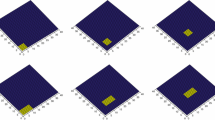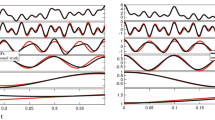
Overview
- First PGD book intended as a manual in the basics of the method
- Only available reference that includes Matlab code to ease the process
- Covers some of the most popular aspects of the technique, particularly real-time simulation
- Includes supplementary material: sn.pub/extras
Part of the book series: SpringerBriefs in Applied Sciences and Technology (BRIEFSAPPLSCIENCES)
Buy print copy
About this book
Proper Generalized Decomposition (PGD) is a method for numerical simulation in many fields of applied science and engineering. As a generalization of Proper Orthogonal Decomposition or Principal Component Analysis to an arbitrary number of dimensions, PGD is able to provide the analyst with very accurate solutions for problems defined in high dimensional spaces, parametric problems and even real-time simulation.
Similar content being viewed by others
Keywords
Table of contents (5 chapters)
Reviews
Authors and Affiliations
Bibliographic Information
Book Title: Proper Generalized Decompositions
Book Subtitle: An Introduction to Computer Implementation with Matlab
Authors: Elías Cueto, David González, Icíar Alfaro
Series Title: SpringerBriefs in Applied Sciences and Technology
DOI: https://doi.org/10.1007/978-3-319-29994-5
Publisher: Springer Cham
eBook Packages: Engineering, Engineering (R0)
Copyright Information: The Author(s) 2016
Softcover ISBN: 978-3-319-29993-8Published: 10 March 2016
eBook ISBN: 978-3-319-29994-5Published: 01 March 2016
Series ISSN: 2191-530X
Series E-ISSN: 2191-5318
Edition Number: 1
Number of Pages: XII, 96
Number of Illustrations: 19 b/w illustrations, 1 illustrations in colour
Topics: Solid Mechanics, Computational Science and Engineering, Numerical and Computational Physics, Simulation



